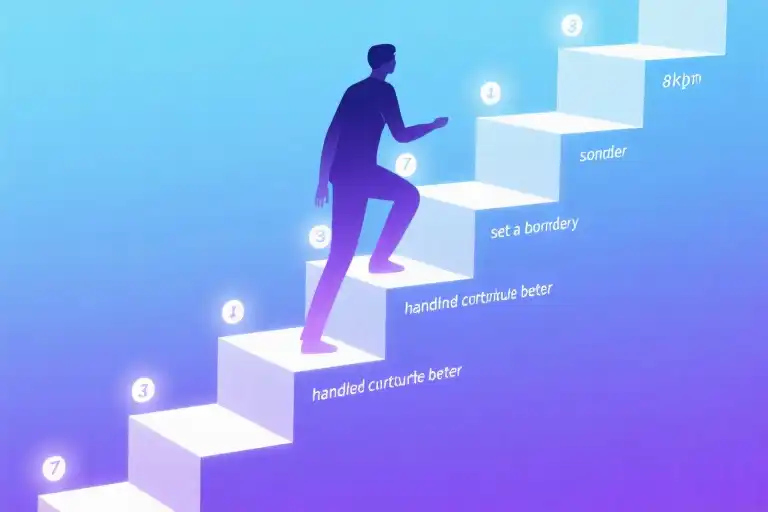That moment when a coworker’s promotion announcement pops up in your team chat—do you feel that subtle clench in your stomach? The way your fingers hover over the congratulatory reaction emoji while your mind races through unspoken comparisons? We’ve all been there, measuring our behind-the-scenes struggles against someone else’s highlight reel.
What most people miss is this paradoxical truth: the very act of feeling stuck often indicates you’re already in motion. Social media has trained us to expect progress in viral-worthy leaps—corner office promotions, startup funding announcements, picture-perfect relationships—when real growth happens through nearly invisible daily increments. The colleague celebrating their promotion today likely spent months quietly developing skills you never saw. The entrepreneur sharing their funding news survived countless rejected pitches beforehand.
This constant comparison creates what psychologists call ‘progress blindness’—our tendency to overlook small wins while fixating on grand milestones. Research from the University of Pennsylvania reveals that 78% of professionals underestimate their own skill development when comparing themselves to peers. We notice others’ sudden breakthroughs but remain oblivious to our gradual transformations: the difficult conversations we now handle with steadier hands, the skills we’ve unconsciously mastered through repetition, the personal boundaries we’ve learned to enforce.
Consider the last time you scrolled through LinkedIn achievements or Instagram milestones. That tightness in your chest wasn’t a sign of failure—it was evidence you still care about growing. The people who trigger these reactions often serve as accidental mirrors, reflecting not where you lack, but where you aspire. What if we began measuring progress not by external validation, but by internal benchmarks? The project you contributed to last year that would intimidate you today. The uncomfortable feedback you now process without defensive reactions. The personal challenges you’ve faced that never made it onto social media.
Growth isn’t about the speed of visible achievements, but the depth of invisible foundations being laid. Every expert was once a beginner who chose to stay. Every master started as a disaster. The frustration you feel about ‘still being here’ might actually be your future self’s gratitude taking shape—thankful you didn’t quit when progress felt impossible to measure.
Why We Feel Stuck: The Psychology of Social Comparison
That tightening in your chest when a former classmate announces their third promotion. The way your fingers hover over the ‘like’ button on a friend’s tropical vacation photos, suddenly hyperaware of your own unchanging routine. These moments reveal a universal truth: we measure our progress against invisible yardsticks held by others.
Social comparison operates in two distinct modes, each with emotional consequences. Upward comparison—measuring ourselves against those we perceive as more successful—often triggers what psychologists call ‘relative deprivation.’ A 2022 Pew Research study found 68% of adults aged 25-34 experience weekly anxiety from career comparisons. Downward comparison, the act of reassuring ourselves by viewing others’ struggles, provides fleeting relief but reinforces a toxic scorekeeping mentality.
Consider Emma, a graphic designer who kept meticulous mental records: ‘By 30, Mark became creative director. Sarah bought a house last spring.’ Her self-created ‘peers timeline’ became a prison of should-haves. The breaking point came when she realized she’d stopped celebrating her freelance clients to avoid ‘jinxing’ her nonexistent race against ghosts of alumni newsletters.
The digital age amplifies this phenomenon through what researchers term ‘comparison inflation.’ A Journal of Social Psychology study demonstrated that 45 minutes of social media browsing temporarily lowers self-evaluation by 32%—equivalent to the drop experienced during major life setbacks. We’re comparing our blooper reels to everyone’s highlight reels, unaware that 84% of those ‘perfect’ posts are strategically cropped or staged (Digital Wellness Institute, 2023).
Yet this instinct to benchmark isn’t inherently destructive. Evolutionary psychologists suggest comparison once helped humans gauge survival strategies. The distortion occurs when we mistake visibility for viability—assuming others’ visible milestones represent the only valid path forward. Your colleague’s promotion doesn’t invalidate your sideways career move into a more fulfilling role. That influencer’s sponsored retreat doesn’t negate your quiet triumph of finally setting work-life boundaries.
The real trap isn’t comparison itself, but our failure to recognize its selective nature. We compare our chapter one to someone else’s chapter twenty, forgetting they too once wrestled with opening sentences. As you scroll through another’s curated achievements tonight, remember: you’re seeing their museum exhibit, not the messy studio where the real work happens.
The Hidden Progress in Your ‘Still Here’ Moments
We often measure progress by the milestones we haven’t reached yet – the promotion that didn’t happen, the business that hasn’t taken off, the relationship status that hasn’t changed. But what if we’ve been looking at the wrong indicators? Your ‘still here’ status isn’t stagnation – it’s an archive of invisible growth.
The Contrast List You Need to Make
Take out a notebook (or open a fresh document) and create three columns:
- Mindset Shifts
- The arguments you walked away from instead of escalating
- The criticism you absorbed without crumbling
- The mornings you got up despite seeing no reason to
- Skill Upgrades
- That software you can now navigate without Googling
- The presentation that would’ve paralyzed you last year
- The difficult conversation you initiated
- Relationship Growth
- The boundary you finally set
- The apology you made unprompted
- The help you asked for without shame
These aren’t abstract concepts – they’re forensic evidence of progress. The person who couldn’t do these things last year? That version of you no longer exists.
Small Wins Theory: Why Tiny Steps Matter
Psychologist Karl Weick’s research on ‘small wins’ reveals how minor successes create momentum. When firefighters face massive wildfires, they focus on creating small containment lines. Each minor success:
- Builds confidence in the approach
- Provides tangible evidence of progress
- Makes the next step feel more possible
Your life operates on the same principle. That email you sent to a potential mentor? Small win. The workout you did despite hating every second? Small win. The night you went to bed early instead of doomscrolling? Monumental win.
Draw Your Resilience Curve
Here’s an uncomfortable but revealing exercise:
- Recall your three worst stress points from last year
- Rate how you handled them then (1=complete meltdown, 10=calm response)
- Now imagine facing those same situations today – what would your rating be?
Most people find their current rating improves by at least 2-3 points. That gap represents your grown capacity to handle life’s pressures – a metric far more valuable than any job title or bank balance.
The paradox of progress is that we rarely notice it happening in real time. Like plants growing or glaciers moving, the changes become visible only in retrospect. Your ‘still here’ isn’t a holding pattern – it’s the quiet work of becoming.
Creating Your Unconventional Progress Bar
The most dangerous lie we tell ourselves isn’t ‘I haven’t made progress’—it’s ‘my progress doesn’t count.’ That spreadsheet you abandoned, the meditation app you used for three days straight, the networking event where you actually spoke to two strangers instead of hiding by the snack table—these aren’t failures. They’re invisible victories that never make it to your mental highlight reel.
Tool 1: The Growth Tracker That Doesn’t Judge You
Traditional productivity tools fail us because they only celebrate finished projects and checked boxes. What we need is something that honors the messy middle—the 17 drafts deleted before writing one good sentence, the mornings you showed up exhausted but showed up anyway.
[Download our Progress-Friendly Tracker] – designed with these unconventional metrics:
- The ‘Better Than Before’ Column: Not what you’ve mastered, but what you now handle with slightly less dread (Example: ‘Can now reply to stressful emails within 24 hours instead of 72’)
- The ‘Micro-Courage’ Log: Tiny acts of bravery that would’ve paralyzed past-you (Example: ‘Asked clarifying question in meeting instead of pretending to understand’)
- The ‘Invisible Upgrades’ Section: Skills you’ve absorbed without noticing (Example: ‘Can now spot when I’m comparing myself and pause the spiral’)
Tool 2: The Comparison Anxiety Dissection Journal
Next time Instagram has you convinced everyone’s lapping you, grab this template:
Trigger: What exactly stung? (Be specific: ‘Seeing former classmate’s startup funding announcement’)
Reality Check: What don’t I see in this highlight? (‘They probably struggled for years before this’)
My Territory: What’s unique about my path? (‘I chose stability over risk to care for family’)
Redirect: One action that aligns with my values (‘Research part-time courses that fit my schedule’)
Your 3-Minute Momentum Starter
Set a timer right now—yes, now—and list:
- One problem you can handle better today than six months ago
- One piece of hard-won knowledge you’d share with past-you
- One ‘unsexy’ skill you’ve developed (Example: ‘Can now cook three decent meals when exhausted’)
These become the first entries in your progress tracker. Not because they’re extraordinary, but because they’re yours. The kind of growth that doesn’t get standing ovations but builds the foundation for everything that eventually will.
The Unmetered Rhythm of Progress
That tightening in your chest when another LinkedIn announcement pops up. The way your fingers hesitate before clicking ‘like’ on an ex-classmate’s tropical vacation photos. These moments have a way of making time feel like quicksand—everyone else surging forward while you’re measuring your life in coffee spills and unanswered emails.
But here’s what no one posts about: progress refuses to be standardized. There are no universal loading screens for human growth, no synchronized countdowns to achievement. Your timeline isn’t buffering—it’s composing.
The Myth of Uniform Velocity
We’ve been conditioned to expect progress in clean, Instagrammable increments: Year 1 – Promotion. Year 3 – House. Year 5 – Six-figure side hustle. Reality paints messier brushstrokes.
Consider the violin:
- First six months: Screeching that could shatter wine glasses
- Year two: Simple tunes with occasional harmony
- Decade later: Vibrato that makes strangers pause mid-conversation
No conservatory measures a student’s progress by comparing their week three to someone else’s year ten. Yet we apply this absurd metric to our lives daily.
Your Private Symphony
Close your eyes and listen:
- The staccato rhythm of failed job applications that taught you resilience
- The legato of small kindnesses you’ve learned to give yourself
- The unexpected key change when Plan B revealed hidden strengths
That’s your progress score—not the sterile percentages on corporate performance reviews or the hollow metrics of social media.
Conducting Your Tempo
Try this instead of comparative measurements:
- Tune your instrument – What skills have you quietly mastered that once seemed impossible? (That panic attack you navigated alone last Tuesday counts.)
- Read the room – Notice where you naturally provide value. The moments people lean in when you speak. The problems they bring to you.
- Mark the rests – Growth happens in pauses too. That month you spent staring at ceilings? Part of the composition.
The musician who worries about keeping pace with the orchestra loses the music. Your life isn’t a race to the final note—it’s the gradual honing of your unique sound.
So tell me, when you stop measuring against others’ movements…what melody does your progress play?






Whats Happening i am new to this, I stumbled upon this I’ve found It positively useful and it has aided me out loads. I am hoping to contribute & help different customers like its aided me. Good job.